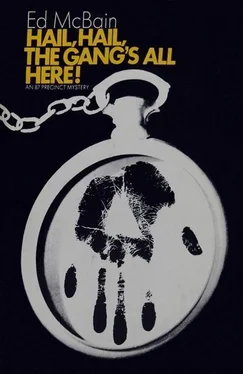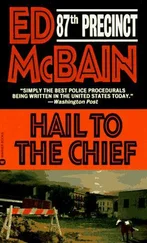“No,” he said. “I won’t be back, Mrs. Gorman.”
In the squadroom, they were wrapping up the night. Their day had begun at 7:45 P.M. yesterday, and they had been officially relieved at 5:45 A.M., but they had not left the office yet because there were still questions to be asked, reports to be typed, odds and ends to put in place before they could go home. And since the relieving detectives were busy getting their approaching workday organized, the squadroom at 6 A.M. was busier than it might have been on any given afternoon, with two teams of cops getting in each other’s way.
In the interrogation room, Carella and Hawes were questioning young Ronald Sanford in the presence of the assistant district attorney who had come over earlier to take Mrs. Martin’s confession, and who now found himself listening to another one when all he wanted to do was go home to sleep. Sanford seemed terribly shocked that they had been able to notice the identical handwriting in “The Addison Hotel” and “The Avenging Angel,” he couldn’t get over it. He thought he had been very clever in misspelling the word “clothes,” because then if they ever had traced the note, they would think some illiterate had written it, and not someone who was studying to be an accountant. He could not explain why he had killed Mercy Howell. He got all mixed up when he tried to explain that. It had something to do with the moral climate of America, and people exposing themselves in public, people like that shouldn’t be allowed to pollute others, to foist their filth upon others, to intrude upon the privacy of others who only wanted to make a place for themselves in the world, who were trying so very hard to make something of themselves, studying accounting by day and working in a hotel by night, what right had these other people to ruin it for everybody else?
Frank Pasquale’s tune, sung in the clerical office to Kling and O’Brien, was not quite so hysterical, but similar to Sanford’s nonetheless. He had got the idea together with Danny Ryder. They had decided between them that the niggers in America were getting too damn pushy, shoving their way in where they didn’t belong, taking jobs away from decent hardworking people who only wanted to be left alone, what right did they have to force themselves on everybody else? So they had decided to bomb the church, just to show the goddamn boogies that you couldn’t get away with shit like that, not in America. He didn’t seem too terribly concerned over the fact that his partner was lying stone-cold dead on a slab at the morgue, or that their little Culver Avenue expedition had cost three people their lives, and had severely injured a half-dozen others. All he wanted to know, repeatedly, was whether his picture would be in the newspaper.
At his desk, Meyer Meyer started to type up a report on the Gorman ghosts, and then decided the hell with it. If the lieutenant asked him where he’d been half the night, he would say he had been out cruising, looking for trouble in the streets. Christ knew there was enough of that around. He pulled the report forms and their separating sheets of carbon paper from the ancient typewriter, and noticed that Detective Hal Willis was pacing the room anxiously, waiting to get at the desk the moment he vacated it.
“Okay, Hal,” he said, “it’s all yours.”
“Finalmente!” Willis, who was not Italian, said.
The telephone rang.
The sun was up when they came out of the building and walked past the hanging green “87” globes and down the low flat steps to the sidewalk. The park across the street shimmered with early morning autumn brilliance, the sky above it clear and blue. It was going to be a beautiful day. They walked toward the diner on the next block, Meyer and O’Brien ahead of the others, Carella, Hawes, and Kling bringing up the rear. They were tired, and exhaustion showed in their eyes and in the set of their mouths, and in the pace they kept. They talked without animation, mostly about their work, their breaths feathery and white on the cold morning air. When they reached the diner, they took off their overcoats and ordered hot coffee and cheese danish and toasted English muffins. Meyer said he thought he was coming down with a cold. Carella told him about some cough medicine his wife had given one of the children. O’Brien, munching on a muffin, glanced across the diner and saw a young girl in one of the booths. She was wearing blue jeans and a brightly colored Mexican serape, and she was talking to a boy wearing a Navy pea jacket.
“I think I see somebody,” he said, and he moved out of the booth past Kling and Hawes, who were talking about the new goddamn regulation on search and seizure.
The girl looked up when he approached the booth.
“Miss Blair?” he said. “Penelope Blair?”
“Yes,” the girl answered. “Who are you?”
“Detective O’Brien,” he said, “the Eighty-seventh Squad. Your mother was in last night, Penny. She asked me to tell you—”
“Flake off, cop,” Penelope Blair said. “Go stop a riot someplace.”
O’Brien looked at her silently for a moment. He nodded then, and turned away, and went back to the table.
“Anything?” Kling asked.
“You can’t win ’em all,” O’Brien said.
The boy who lay naked on the concrete in the backyard of the tenement was perhaps eighteen years old. He wore his hair quite long, and he had recently begun growing a beard. His hair and his beard were black. His body was very white, and the blood that oozed onto the concrete pavement beneath him was very red.
The superintendent of the building discovered him at two minutes before 6 A.M., when he went to put his garbage in one of the cans out back. The boy was lying facedown in his own blood, and the super did not recognize him. He was shocked, of course. He did not ordinarily discover naked dead men in the backyard when he went to put out his garbage. But considering his shock, and considering his advanced age (he was approaching eighty), he managed to notify the police with considerable dispatch, something not every good citizen of the city managed to do quite so well or so speedily.
Hal Willis arrived on the scene at fifteen minutes pat six, accompanied by Richard Genero, who was the newest man on the squad, having been recently promoted from patrolman to detective 3rd/Grade. Forbes and Phelps, the two men from Homicide, were already there. It was Willis’s contention that any pair of Homicide cops was the same as any other pair of Homicide cops. He had never, for example, seen Forbes and Phelps in the same room with Monoghan and Monroe. Was this not undeniable proof that they were one and the same couple? Moreover, it seemed to Willis that all Homicide cops exchanged clothing regularly, and that Forbes and Phelps could on any given day of the week be found wearing suits and overcoats belonging to Monoghan and Monroe.
“Good morning,” Willis said.
“Morning,” Phelps said.
Forbes grunted.
“Nice way to start a goddamn Sunday, right?” Phelps asked.
“You fellows got here pretty fast,” Genero said.
Forbes looked at him. “Who’re you?”
“Dick Genero.”
“Never heard of you,” Forbes said.
“I never heard of you, neither,” Genero answered, and glanced to Willis for approval.
“Who’s the dead man?” Willis asked drily. “Anybody ever hear of him? ”
“He sure as hell ain’t carrying any identification,” Phelps said, and cackled hoarsely.
“Not unless he’s got it shoved up his ass someplace,” Forbes said, and began laughing along with his partner.
“Who found the body?” Willis asked.
“Building superintendent.”
Читать дальше












